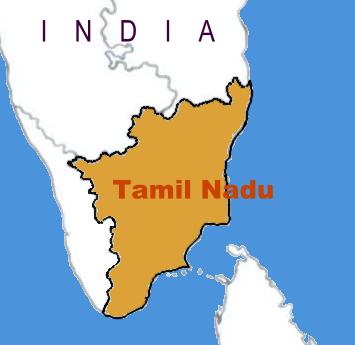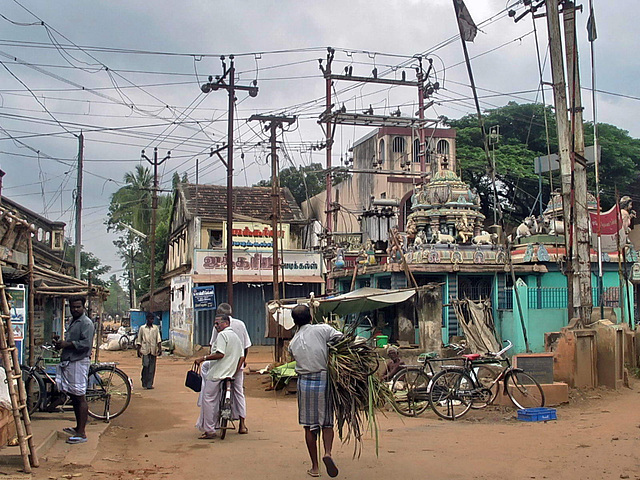SPPD – helping communities in Tamil Nadu, India
 By Denise Nanni and Milena
By Denise Nanni and Milena
Rampoldi, ProMosaik. Today on our journey through the world of humanitarian
associations we are moving to India to talk to Alfred of the organization SPPD,
supporting poor communities in rural areas in Tamil Nadu in the South-East of
India. Would like to thank him for this time and detailed answers.
How was SPPD founded and what are its main objectives?
At the heart of SPPD’s culture is, the desire to give and
make a difference to the poor and communities below poverty line and their
families. SPPD is driven by a purpose to care for the community with a mindset
of collaboration and innovation.
make a difference to the poor and communities below poverty line and their
families. SPPD is driven by a purpose to care for the community with a mindset
of collaboration and innovation.
There is a huge gap that exists between those who
get good education at private schools
and those who have access only to the sub-standard government schools and
low-cost, poor quality private schools. This gap creates the inequality that
results in the privileged few going on to college and getting meaningful jobs,
while others simply drop out of the system.
get good education at private schools
and those who have access only to the sub-standard government schools and
low-cost, poor quality private schools. This gap creates the inequality that
results in the privileged few going on to college and getting meaningful jobs,
while others simply drop out of the system.
Quality of Education offered in village schools in Tamil Nadu
was far from satisfactory and never helped the village students to compete with
the students from urban and semi – urban regions. It was a matter of grave
concern and has become a principal reason for most of the drop – outs. Hence, it became imperative to
infuse confidence in the minds of the village students by providing additional
channels to improve their academic competency.
was far from satisfactory and never helped the village students to compete with
the students from urban and semi – urban regions. It was a matter of grave
concern and has become a principal reason for most of the drop – outs. Hence, it became imperative to
infuse confidence in the minds of the village students by providing additional
channels to improve their academic competency.
It was in 1994, August Mr.J.Raju (Founder of SPPD) and his few friends initiated their
First Evening Study Centre in Sinthampatti. The main motive tagging this
initiative was to balance the inequality in education that prevailed in the
rural areas. Our intention was to help the rural children to complete their
regular homework and daily study. Though
residing at Thanneerpalli, a rural- wet land area, our concentration was diverted towards the dry belts of
Soriyampatti in Musiri Block. Free
tuition with duration of two hours is given in common to the children of all
grade levels. After one successful year of implementation, we had legally
registered ourselves as a Society in 1995.
First Evening Study Centre in Sinthampatti. The main motive tagging this
initiative was to balance the inequality in education that prevailed in the
rural areas. Our intention was to help the rural children to complete their
regular homework and daily study. Though
residing at Thanneerpalli, a rural- wet land area, our concentration was diverted towards the dry belts of
Soriyampatti in Musiri Block. Free
tuition with duration of two hours is given in common to the children of all
grade levels. After one successful year of implementation, we had legally
registered ourselves as a Society in 1995.
Vision : SPPD envisions a secured and a sustainable
community South India.
community South India.
Mission : SPPD
recognizes the need to support and encourage the sustainable development of
education for children and adolescents, empowerment of women and the
environment for self sustaining communities.
recognizes the need to support and encourage the sustainable development of
education for children and adolescents, empowerment of women and the
environment for self sustaining communities.

What are the main social issues in your region of
intervention?
intervention?
Though India
has made significant strides towards poverty reduction and changed the economic
situation over the past decade, Imbalance empower relation, unequal resource
distribution, unequal access to economic opportunities, frequent disasters and
social complexities disproportionately hampers the progress of rural
disadvantaged, marginalised and person with disabilities, rural youth, children, women, dryland,
farmers and physically challenged people.
has made significant strides towards poverty reduction and changed the economic
situation over the past decade, Imbalance empower relation, unequal resource
distribution, unequal access to economic opportunities, frequent disasters and
social complexities disproportionately hampers the progress of rural
disadvantaged, marginalised and person with disabilities, rural youth, children, women, dryland,
farmers and physically challenged people.
How do you promote women’s rights and empowerment?
Women Empowerment refers to strengthening the
social, economic and educational powers of women. It refers to an
environment where there is no gender bias and have equal rights in community,
society and workplaces.
social, economic and educational powers of women. It refers to an
environment where there is no gender bias and have equal rights in community,
society and workplaces.
Women
empowerment refers to strengthening the social, economic and powers of women.
Towards this end, the Self Help Group (SHG) programme was initiated in 1997 and
has a stable growth over the years. 3000
SHGs with a total membership of 35000 women were formed.
empowerment refers to strengthening the social, economic and powers of women.
Towards this end, the Self Help Group (SHG) programme was initiated in 1997 and
has a stable growth over the years. 3000
SHGs with a total membership of 35000 women were formed.
Our
goals are education, empowerment, improved health and safety for all women in
our district. To help women gain
financial independence, since 2004 SPPD has provided them with financial
inclusion through micro credit loans at competitive interest rates, with
the assistance of banking and
non-banking financial institutions. The loans were utilized to initiate Income generation activities.
goals are education, empowerment, improved health and safety for all women in
our district. To help women gain
financial independence, since 2004 SPPD has provided them with financial
inclusion through micro credit loans at competitive interest rates, with
the assistance of banking and
non-banking financial institutions. The loans were utilized to initiate Income generation activities.
SPPD
has used SHG as a platform to emphasize the social awareness to the community,
to widen their knowledge on health, water and sanitation (particularly HIV/AIDS
and STIs) education, protection of the environment and how to lead a healthy
and hygienic life style.
has used SHG as a platform to emphasize the social awareness to the community,
to widen their knowledge on health, water and sanitation (particularly HIV/AIDS
and STIs) education, protection of the environment and how to lead a healthy
and hygienic life style.
How extended are the problems of child labour and
street children and how do you address these issues?
street children and how do you address these issues?
SPPD have been working in the areas
of Child Education, Health &
Nutrition, Child Protection, children who are affected by HIV/AIDS, Tuberculosis
infected parents is generally a
family dealing with crisis, illness, lack of resources, and social isolation,
and in need of medical, psychological and social services. SPPD is assisting these 900 children, and their families through nutrition, education aids
to improve the quality of life. Students in rural areas of Trichy
and neighbouring districts are assisted with their homework by offering free
tuitions, (Evening Study Centres educational supplies and nutritional supplement). We have project for Street children and
child labour but have not taken up the project for lack of funds.
of Child Education, Health &
Nutrition, Child Protection, children who are affected by HIV/AIDS, Tuberculosis
infected parents is generally a
family dealing with crisis, illness, lack of resources, and social isolation,
and in need of medical, psychological and social services. SPPD is assisting these 900 children, and their families through nutrition, education aids
to improve the quality of life. Students in rural areas of Trichy
and neighbouring districts are assisted with their homework by offering free
tuitions, (Evening Study Centres educational supplies and nutritional supplement). We have project for Street children and
child labour but have not taken up the project for lack of funds.
Do you cooperate with local authorities and
institutions? If yes, how?
institutions? If yes, how?
SPPD
and government alike have begun to appreciate the advantages of cooperating
more closely, both to meet the challenges described above and to enhance
democratic participation.
and government alike have begun to appreciate the advantages of cooperating
more closely, both to meet the challenges described above and to enhance
democratic participation.
Participation
is about meeting the interests of the whole community. When every member of a
community has the chance, directly or through representation by local partners,
to participate in the design, implementation and monitoring of programs, there
is a higher likelihood that the initiative accurately reflects their real needs
and interests. Partners play an essential role in encouraging participation and
ensuring different experiences, needs and capabilities of various groups in a
community are heard, including those of women and men, youth and the elderly,
persons with disabilities and the able bodied, ethnic/religious/language
minorities and majorities.
is about meeting the interests of the whole community. When every member of a
community has the chance, directly or through representation by local partners,
to participate in the design, implementation and monitoring of programs, there
is a higher likelihood that the initiative accurately reflects their real needs
and interests. Partners play an essential role in encouraging participation and
ensuring different experiences, needs and capabilities of various groups in a
community are heard, including those of women and men, youth and the elderly,
persons with disabilities and the able bodied, ethnic/religious/language
minorities and majorities.
Networking,
collaboration and coordination mechanism established among different actors
through awareness creation, participatory planning and collective actions
undertaken to effective people friendly social and economic activities.
collaboration and coordination mechanism established among different actors
through awareness creation, participatory planning and collective actions
undertaken to effective people friendly social and economic activities.
Field
experience, lesson learned and good practices are documented and disseminated
among different stakeholders in turn can promote local agenda for friendly
governance.
experience, lesson learned and good practices are documented and disseminated
among different stakeholders in turn can promote local agenda for friendly
governance.
Disaster
Response and Humanitarian Aid- Relief, Recovery, Rehabilitation Services.
Response and Humanitarian Aid- Relief, Recovery, Rehabilitation Services.
Relief, Recovery
and Rehabilitation services with particular attention to the most vulnerable SPPD
provides humanitarian assistance to people affected by natural or man made
disasters, people, and once the most urgent needs are taken care of, we set out
to work with affected communities to rebuild homes and livelihoods, and
strengthen their capacity to manage future disasters.
and Rehabilitation services with particular attention to the most vulnerable SPPD
provides humanitarian assistance to people affected by natural or man made
disasters, people, and once the most urgent needs are taken care of, we set out
to work with affected communities to rebuild homes and livelihoods, and
strengthen their capacity to manage future disasters.
India faces many
environmental hazards such as deforestation, soil erosion, overgrazing and
desertification. Floods and flash floods are usually the result of tropical
storms and cyclones in the monsoon period, which is not new to India.
environmental hazards such as deforestation, soil erosion, overgrazing and
desertification. Floods and flash floods are usually the result of tropical
storms and cyclones in the monsoon period, which is not new to India.


